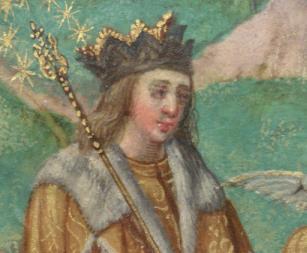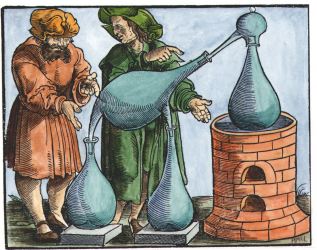| Author | Post |
|---|
Paul Ferguson
Member

| Joined: | Fri Feb 15th, 2008 |
| Location: | |
| Posts: | 1538 |
| Status: |
Offline
|
|
Posted: Tue Apr 1st, 2008 11:04 am |
|
It was interesting to note that the lady in the extract from the Nuremberg version of the Splendor Solis at http://www.alchemywebsite.com/weblog.html (entry for 27 March 2008) appears to have strabismus. Does this have some symbolic significance, or was she the only model available to the artist? Since I'm inclined to believe that just about everything in alchemical illustrations means something, I'm intrigued.
Thoughts?
Paul
|
adammclean
Member

| Joined: | Fri Sep 14th, 2007 |
| Location: | United Kingdom |
| Posts: | 606 |
| Status: |
Offline
|
|
Posted: Tue Apr 1st, 2008 08:55 pm |
|
It is possible to rather over-interpret alchemical emblems. In this case, the Splendor solis manuscripts, having been made by major artists of the early 16th century, are somewhat removed from the original designs (probably only rough sketches) which the alchemical writer of the manuscript would have conceived. So one perhaps should not read too much into the style of the actual illuminations.
The artist who created the Nurnberg manuscript, had a particular way of depicting human faces. When forty years later this manuscript was being copied in making what is now the British Library version, that artist/copyist was sufficiently unhappy in this rendering of the faces and entirely reworked these in a new style. So we should not read too much into these details.
What is also quite interesting is that in the Nurnberg the angel woman gazes directly at the naked male figure emerging from the swamp, while in the British Library version, she averts her gaze and stares somewhat abstractedly to the side. I don't think we can read anything into this, apart from the mindset and concerns of the artist.
Here is another face from the Nurnberg manuscript. These are particularly characterised by this strange red blushing, which rather spoils the fineness of the features. It has made me wonder if this rose tint across all the faces might have been added later by an owner of the manuscript, rather than executed by the artist. It is such a distinguishing feature, that it should immediately identify the artist, however, despite my looking through a number of reference works I could find no similar feature in illuminated manuscripts of the early to mid 16th century.
Attached Image (viewed 1565 times):
 Last edited on Tue Apr 1st, 2008 08:56 pm by adammclean
|
Paul Ferguson
Member

| Joined: | Fri Feb 15th, 2008 |
| Location: | |
| Posts: | 1538 |
| Status: |
Offline
|
|
Posted: Thu Apr 3rd, 2008 12:00 pm |
|
Another question about the female figure in this image: is she pregnant? The lower part of her dress projects some way beyond what would expect,
Paul
|
Alexander Guthrie Stewart
Member
| Joined: | Sat Feb 16th, 2008 |
| Location: | |
| Posts: | 192 |
| Status: |
Offline
|
|
Posted: Thu Apr 3rd, 2008 07:38 pm |
|
| Might it not be that they simply wanted to express how full of health and vigour the figures were, so made sure the lips and cheeks were red?
|
Paul Ferguson
Member

| Joined: | Fri Feb 15th, 2008 |
| Location: | |
| Posts: | 1538 |
| Status: |
Offline
|
|
Posted: Fri Apr 4th, 2008 01:25 am |
|
Another question and a comment:
Why is this plate in 8th position in the 1598 London edition and apparently in 9th position everywhere else?
http://hdelboy.club.fr/gravures.html
Since the theme of this plate seems to be rubedo, could that help explain the ruddy cheeks?
|
adammclean
Member

| Joined: | Fri Sep 14th, 2007 |
| Location: | United Kingdom |
| Posts: | 606 |
| Status: |
Offline
|
|
Posted: Fri Apr 4th, 2008 11:36 am |
|
Paul Ferguson wrote: Another question and a comment:
Why is this plate in 8th position in the 1598 London edition and apparently in 9th position everywhere else?
No, it is the eighth emblem in the earliest manuscript (in Berlin). Where is it the ninth figure ?
Since the theme of this plate seems to be rubedo, could that help explain the ruddy cheeks?
No, all the faces in all the emblems have the same stylised ruddy cheeks. It is global across the whole Nurnberg manuscript, and is not found in the other manuscripts. It is obviously a manifestation of the painter's style and not part of the symbolism itself.
|
adammclean
Member

| Joined: | Fri Sep 14th, 2007 |
| Location: | United Kingdom |
| Posts: | 606 |
| Status: |
Offline
|
|
Posted: Fri Apr 4th, 2008 11:41 am |
|
Paul Ferguson wrote: Another question about the female figure in this image: is she pregnant? The lower part of her dress projects some way beyond what would expect,
No. This appears to be a feature of the artist's style. The other female figures in the manuscript are depicted with similar full dresses. Indeed, even the male figures in togas, have a very full projecting costume. This is just a feature of the artists ideosyncratic style.
|
Paul Ferguson
Member

| Joined: | Fri Feb 15th, 2008 |
| Location: | |
| Posts: | 1538 |
| Status: |
Offline
|
|
Posted: Fri Apr 4th, 2008 11:56 am |
|
adammclean wrote: Paul Ferguson wrote: Another question and a comment:
Why is this plate in 8th position in the 1598 London edition and apparently in 9th position everywhere else?
No, it is the eighth emblem in the earliest manuscript (in Berlin). Where is it the ninth figure ?
Berlin 1582:
http://hdelboy.club.fr/Splendor_1582_9.jpg
& Hamburg 1708:
http://hdelboy.club.fr/Splendor_hamburg_9.jpg
or are these errors by the hdelboy webmaster?
|
adammclean
Member

| Joined: | Fri Sep 14th, 2007 |
| Location: | United Kingdom |
| Posts: | 606 |
| Status: |
Offline
|
|
Posted: Fri Apr 4th, 2008 02:58 pm |
|
Paul Ferguson wrote:
Berlin 1582:
http://hdelboy.club.fr/Splendor_1582_9.jpg
& Hamburg 1708:
http://hdelboy.club.fr/Splendor_hamburg_9.jpg
or are these errors by the hdelboy webmaster?
Both of these have been wrongly numbered by the organiser of that website.
Also there is no Berlin 1582 manuscript. What he is showing is the first known manuscript (Berlin) dated to around 1530. The image shown there is definitely number 8 in the manuscript. I have a facsimile.
The engraving from the 1708 printed book is also number eight in the sequence.
|

Current time is 09:34 am | |
|

